
Acesulfame potassium is a zero-calorie sweetener that is added to many sugar-free…



Sorbic acid (E200) is a naturally occurring organic compound found in certain berries that is used as a food preservative due to its antimicrobial properties. It is particularly effective against molds, yeast, and some bacteria, helping to extend the shelf life of various food products. Sorbic acid is normally synthetically produced through the condensation of malonic acid with trans-butenal derived from crotonaldehyde. It is used in a range of food items, including baked goods, cheese, beverages, and condiments.

Sorbic acid is a naturally occurring anti-fungal compound, however, it is usually synthetically created for use as a food preservative. Animal studies have suggested no adverse effects from consumption, however, human research is lacking. Under extreme conditions unlikely to occur in normal food production, sorbic acid may react with nitrites to form mutagenic compounds.
Health is like a bank account, certain ingredients make a deposit into your health bank, meaning they add to
your health. Certain ingredients withdraw from your health bank. We want health promoting ingredients in our diet. To keep things simple, we rate ingredients on a green, yellow, red scale:

It is naturally occurring in food and has no harmful effects on the body. It is real food. It is health promoting.

It goes into one or more of the below categories

It is known to have a harmful effect on the body (ex. All food colorings, Natural Flavors, MSG, Potassium bromate, aspartame, artificial flavors)



The Food Showdown: Popcorners flavors
Ingredient Rating: Canola oil – is it bad for you?
Clean Consuming: Nourishment for your

We have accomplished so much in just 1 year since our launch in March of 2023! We now have 10,000

The Nacho Chip Food Showdown, is Tapioca Starch safe in food? and a must-see documentary on America’s food system.
Stay in the know with the latest ratings, articles, and our newsletter, The Dirt.